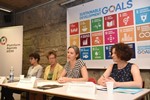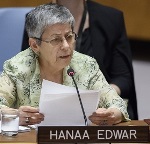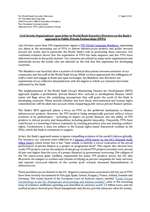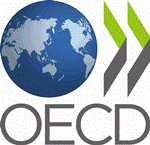Social Watch news
Published on Fri, 2018-07-06 00:00
The Private Sector and the Sustainable Development Goals |
Published on Tue, 2018-07-03 00:00
Swiss civil society – organized in the Platform Agenda 2030 – presented its report entitled «How sustainable is Switzerland? Implementing the 2030 Agenda from a civil society perspective». Platform Agenda 2030 – Press Release of 3 July 2018 |
Published on Wed, 2018-06-20 00:00
Despite the Czech Republic stagnating in the worldwide effort to bring about gender equality, the country’s government plans to cut funding for equality projects significantly in the coming years. That’s according to the Czech branch of the international NGO network, Social Watch. Eurostat data sets the country’s pay gap at more than 20 percent, while at the same time the difference between men and women being able to find employment lies at 15 percent. |
Published on Fri, 2018-06-08 14:12
Ms. Hanaa Edwar, Chairperson of Iraqi Al-Amal Association, participated at the UN Security Council Open Debate on the Protection of Civilians in Armed Conflicts that was held in New York, 22nd May 2018. Hanaa highlighted that civilians who have suffered must have access to justice and accountability. The Security Council Resolution in 2017 on Da’esh accountability, and the Joint Communique on the Reduction and Response to Sexual Violence in Armed Conflict signed in September 2016 are crucial documents and she urge to support their implementation. She said there must be accountability for all harm committed in Iraq by all parties to the conflict. Accountability should not be limited to some people and some types of violations. All civilians deserve redress for their suffering. This must be clearly linked to reconciliation efforts. |
Published on Tue, 2018-05-29 18:07
Partnerships for Sustainable Development – inclusive and accountable or laissez-faire marketplace?Current conventional wisdom has it that partnerships are crucial for the success of the of the 2030 Agenda for Sustainable Development and the achievement of the Sustainable Development Goals (SDGs). However, the UN approach to engaging in stakeholder partnerships is rooted in pre-2030 Agenda practices and perspectives. It has been shepherded by UN offices mainly concerned with resource mobilization and often amounts to fitting UN development activities into a pipeline of bankable projects. |
Published on Sat, 2018-04-28 16:26
After two years of measuring for SDG implementation the emphasis has shifted from the pressure to develop a global indicator framework to the need for capacity development. This has generated a significant increase in interest in national statistical offices (NSOs) for data disaggregation, not only by income, gender and population group but also by municipal and neighborhood levels in an effort to ’leave no one behind’. The shift to implementation and capacity-building has also spawned a host of initiatives and partnerships, designed primarily to enable NSOs to integrate data from non-traditional sources, such as satellite imagery, mobile phones, and social media and scanning data. |
Published on Fri, 2018-04-20 11:40
The Addis Ababa Action Agenda (AAAA) has defined the follow-up process for the Financing for Development process as well as the means of implementation of the 2030 Agenda for Sustainable Development. This includes assessing progress, obstacles, challenges as well as new and emerging topics of relevance, and “provide policy recommendations for action by the international community” (para. 131). At a side-event during the 2018 ECOSOC Forum on Financing for Development Follo-up, participants are invited to provide their insights into their assessment of previous FfD Fora, their link with other international processes, and discuss with participants about opportunities and challenges, also with view to the upcoming High-level Dialogue on Financing for Development of the General Assembly in 2019. The format of the side event will be highly interactive. After a short framing presentation, the moderator will facilitate active dialogue with a small panel of respondents and the audience. |
Published on Tue, 2018-04-17 15:40
Last October, more than 150 organisations signed a PPP Global Campaign Manifesto, expressing our alarm at the increasing use of PPPs to deliver infrastructure projects and public services around the world, and in particular the World Bank’s role in promoting these contracts. Our combined evidence shows that the experience of PPPs has been negative, and few PPPs have delivered results in the public interest. Our concerns are echoed by many more organisations and individuals across the world, who are alarmed by the risk that this represents for developing countries. |
Published on Mon, 2018-04-16 00:00
The Indian state government of Tamil Nadu this year presented a Gender Budget Statement as part of the annual budget documents, quantifying the allocations that will benefit women during this fiscal year. Finance Secretary K. Shanmugam said it is the first time such an exercise has been undertaken. Kamakshi Sundaramurthy, senior researcher of Social Watch Tamil Nadu, said the gender budget does not address the needs of sub-categories among women, such as those from among the minorities, Dalits and sub-castes. “These women need better education, healthcare and hostel facilities. Employment is also critical for their empowerment. They need the gender budget more than any of us but remain excluded,” Ms. Sundaramurthy said. |
Published on Wed, 2018-04-11 14:43
Figures released on 10 April by the Federal Council show that Switzerland has clearly missed its own development assistance target. The country is thus moving further away from the international goal of allocating 0.7% of gross national income to development funding. While this allocation remained just about stable across OECD countries, in Switzerland it dropped from 0.53% to 0.46%. A hefty 14% contraction. |
SUSCRIBE TO OUR NEWSLETTER











